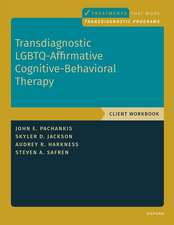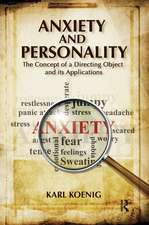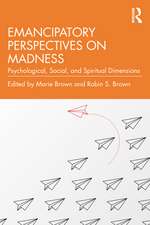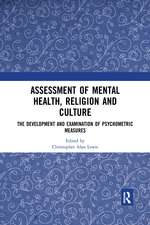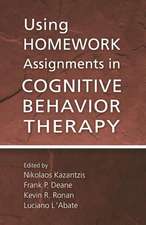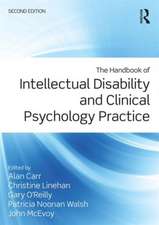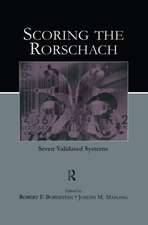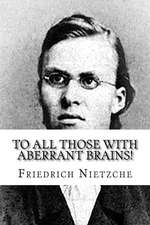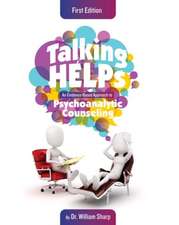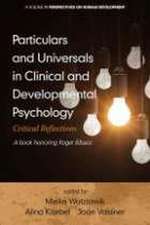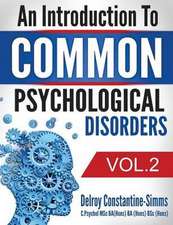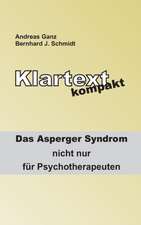Measurement Theory in Action: Case Studies and Exercises
Autor Kenneth S Shultz, David Whitney, Michael J Zickaren Limba Engleză Paperback – 30 dec 2020
Updated throughout to reflect recent changes in the field, the new edition also features:
- Recent changes in understanding measurement, with over 50 new and updated references
- Explanations of why each chapter, article, or book in each module’s Further Readings section is recommended
- Instructors will find suggested answers to the book’s questions and exercises; detailed solutions to the exercises; test bank with 10 multiple choice and 5 short answer questions for each module; and PowerPoint slides. Students and instructors can access SPSS data sets; additional exercises; the glossary; and additional information helpful in understanding psychometric concepts.
| Toate formatele și edițiile | Preț | Express |
|---|---|---|
| Paperback (1) | 474.78 lei 6-8 săpt. | |
| Taylor & Francis – 30 dec 2020 | 474.78 lei 6-8 săpt. | |
| Hardback (1) | 1008.17 lei 6-8 săpt. | |
| Taylor & Francis – 30 dec 2020 | 1008.17 lei 6-8 săpt. |
Preț: 474.78 lei
Nou
Puncte Express: 712
Preț estimativ în valută:
90.85€ • 95.09$ • 75.62£
90.85€ • 95.09$ • 75.62£
Carte tipărită la comandă
Livrare economică 01-15 aprilie
Preluare comenzi: 021 569.72.76
Specificații
ISBN-13: 9780367192181
ISBN-10: 0367192187
Pagini: 434
Ilustrații: 20 Line drawings, black and white; 5 Halftones, black and white; 34 Tables, black and white; 25 Illustrations, black and white
Dimensiuni: 152 x 229 x 23 mm
Greutate: 0.58 kg
Ediția:Nouă
Editura: Taylor & Francis
Colecția Routledge
Locul publicării:Oxford, United Kingdom
ISBN-10: 0367192187
Pagini: 434
Ilustrații: 20 Line drawings, black and white; 5 Halftones, black and white; 34 Tables, black and white; 25 Illustrations, black and white
Dimensiuni: 152 x 229 x 23 mm
Greutate: 0.58 kg
Ediția:Nouă
Editura: Taylor & Francis
Colecția Routledge
Locul publicării:Oxford, United Kingdom
Cuprins
About the Authors
Preface
Introduction
Module 1. Introduction and Overview
Module 2. Statistics Review for Psychological Measurement
Module 3. Psychological Scaling
Module 4. Test Preparation and Specification
Reliability, Validity, and Test bias
Module 5. Reliability Overview: Classical Test Theory
Module 6. Estimating Reliability
Module 7. Content Validation
Module 8. Criterion-Related Validation
Module 9. Construct Validation
Module 10. Validity Generalization and Psychometric Meta-Analysis
Module 11. Test Bias, Unfairness, and Equivalence
Practical Issues in Test Construction
Module 12. Developing Tests of Maximal Performance
Module 13. Classical Test Theory Item Analysis
Module 14. Scoring Tests
Module 15. Developing Measures of Typical Performance
Module 16. Response Biases
Advanced Topics
Module 17. Combining Predictors Using Multiple Regression
Module 18. Exploratory Factor Analysis
Module 19. Confirmatory Factor Analysis
Module 20. Item Response Theory
Module 21. Applications of Item Response Theory: Computer Adaptive Testing and Differential Item Functioning
Module 22. Generalizability Theory
Appendix A. Course-Long Exercise on Psychological Scale Development
Appendix B. Data Set Descriptions
Glossary of Key Terms
References
Author Index
Subject Index
Preface
Introduction
Module 1. Introduction and Overview
Module 2. Statistics Review for Psychological Measurement
Module 3. Psychological Scaling
Module 4. Test Preparation and Specification
Reliability, Validity, and Test bias
Module 5. Reliability Overview: Classical Test Theory
Module 6. Estimating Reliability
Module 7. Content Validation
Module 8. Criterion-Related Validation
Module 9. Construct Validation
Module 10. Validity Generalization and Psychometric Meta-Analysis
Module 11. Test Bias, Unfairness, and Equivalence
Practical Issues in Test Construction
Module 12. Developing Tests of Maximal Performance
Module 13. Classical Test Theory Item Analysis
Module 14. Scoring Tests
Module 15. Developing Measures of Typical Performance
Module 16. Response Biases
Advanced Topics
Module 17. Combining Predictors Using Multiple Regression
Module 18. Exploratory Factor Analysis
Module 19. Confirmatory Factor Analysis
Module 20. Item Response Theory
Module 21. Applications of Item Response Theory: Computer Adaptive Testing and Differential Item Functioning
Module 22. Generalizability Theory
Appendix A. Course-Long Exercise on Psychological Scale Development
Appendix B. Data Set Descriptions
Glossary of Key Terms
References
Author Index
Subject Index
Notă biografică
Kenneth S. Shultz is Professor of Psychology at California State University, San Bernardino, USA. He teaches classes in I-O psychology, research methods, psychological testing, and statistics. He has more than 55 peer-reviewed articles, four books, and 15 book chapters. He was the recipient of the 2014-2015 John M. Pfau Outstanding Professor Award at CSUSB.
David J. Whitney is Professor of Psychology at California State University, Long Beach, USA. He teaches classes in I-O psychology, psychological testing, introductory statistics, and Autism Spectrum Disorder. With 25 peer-reviewed publications, he is among the most cited researchers from his university.
Michael J. Zickar is Sandman Professor of Industrial-Organizational Psychology at Bowling Green State University, Ohio, USA. He teaches classes in I-O psychology, psychometrics, and the history of psychology. He has published more than 60 peer-reviewed articles. He is also a Fellow of the Society for Industrial-Organizational Psychology.
David J. Whitney is Professor of Psychology at California State University, Long Beach, USA. He teaches classes in I-O psychology, psychological testing, introductory statistics, and Autism Spectrum Disorder. With 25 peer-reviewed publications, he is among the most cited researchers from his university.
Michael J. Zickar is Sandman Professor of Industrial-Organizational Psychology at Bowling Green State University, Ohio, USA. He teaches classes in I-O psychology, psychometrics, and the history of psychology. He has published more than 60 peer-reviewed articles. He is also a Fellow of the Society for Industrial-Organizational Psychology.
Recenzii
"Students… appreciate the short modules and the applied examples. Students use the exercises and examples to make the concepts come to life." – Jennifer Kisamore, PhD
Praise for Previous Edition:
"As someone who has frequently taught measurement courses, I am a firm believer that student learning of the material is critically tied to being able to apply the core techniques. This book provides tremendous opportunities for application of fundamental measurement concepts and techniques in all key aspects of the test development and validation process." – Ronald S. Landis, Illinois Institute of Technology, USA
"This is an excellent introduction to psychometrics with a strong hands-on emphasis. The writing is clear and easy to follow. This is an invaluable resource for students new to psychological and educational measurement as well as for instructors looking for solid examples to use in their courses." – Adam Meade, North Carolina State University, USA
"This book offers a view of measurement and measurement practice that goes beyond most books on measurement, which are so analytical that they might well be called "Measurement theory inaction." Highly recommended for anyone interested in views on measurement theory." – Michael James Zyphur, University of Melbourne, Australia
"I love the practical questions, case studies, and exercises. …The authors are wonderful writers. ... It is accessible to undergraduates and … graduate students … I will use it, and I will most definitely recommend it to everyone. ... Practitioners wanting a refresher in measurement would find this valuable." – Lisa Finkelstein, Northern Illinois University, USA
"The target market for this book can be expanded beyond just psychology/education students to include business management students. As someone who teaches research methods to these students, I believe there is a dire need for such measurement texts. ...I am more than happy to adopt it and recommend to my colleagues." – Debi P. Mishra, State University of New York – Binghamton, USA
"It is a very easy book to pick up and read. … Half of the instructor’s battle ... is simply getting the students to read the assigned material. Shultz and Whitney [and Zickar] make it easy to win that battle. ...The students really seem to like it. ...Some of [case studies] are "dead-on" relevant to situations that my students find themselves in. ...It’s a great text." – Dennis Devine, Indiana University- Purdue University Indianapolis, USA
Praise for Previous Edition:
"As someone who has frequently taught measurement courses, I am a firm believer that student learning of the material is critically tied to being able to apply the core techniques. This book provides tremendous opportunities for application of fundamental measurement concepts and techniques in all key aspects of the test development and validation process." – Ronald S. Landis, Illinois Institute of Technology, USA
"This is an excellent introduction to psychometrics with a strong hands-on emphasis. The writing is clear and easy to follow. This is an invaluable resource for students new to psychological and educational measurement as well as for instructors looking for solid examples to use in their courses." – Adam Meade, North Carolina State University, USA
"This book offers a view of measurement and measurement practice that goes beyond most books on measurement, which are so analytical that they might well be called "Measurement theory inaction." Highly recommended for anyone interested in views on measurement theory." – Michael James Zyphur, University of Melbourne, Australia
"I love the practical questions, case studies, and exercises. …The authors are wonderful writers. ... It is accessible to undergraduates and … graduate students … I will use it, and I will most definitely recommend it to everyone. ... Practitioners wanting a refresher in measurement would find this valuable." – Lisa Finkelstein, Northern Illinois University, USA
"The target market for this book can be expanded beyond just psychology/education students to include business management students. As someone who teaches research methods to these students, I believe there is a dire need for such measurement texts. ...I am more than happy to adopt it and recommend to my colleagues." – Debi P. Mishra, State University of New York – Binghamton, USA
"It is a very easy book to pick up and read. … Half of the instructor’s battle ... is simply getting the students to read the assigned material. Shultz and Whitney [and Zickar] make it easy to win that battle. ...The students really seem to like it. ...Some of [case studies] are "dead-on" relevant to situations that my students find themselves in. ...It’s a great text." – Dennis Devine, Indiana University- Purdue University Indianapolis, USA
Descriere
This book helps readers apply testing and measurement theories and features 22 self-contained modules which instructors can match to their courses. Each module features an overview of a measurement issue and a step-by-step application of that theory.


